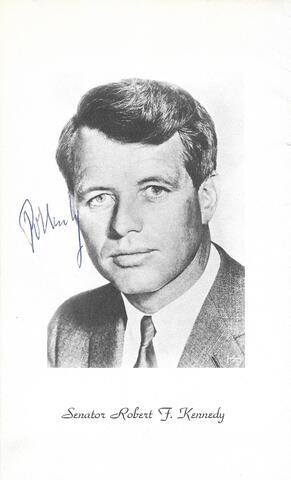
Dinner program autographed by Senator Robert F. Kennedy, May 10, 1968 (James Rogan Collection)
(Excerpted from James Rogan's 2018 book, On to Chicago: Rediscovering Robert F. Kennedy and the Lost Campaign of 1968)
I was finishing the fifth grade in the spring of 1968. Although only a 10-year-old boy, no political pundit awaited the start of that presidential campaign year more eagerly than I. Since Ronald Reagan's election to our state's governorship, I had developed an unquenchable fascination for American history and politics, and 1968 would be my first national election to follow with great passion.
My elementary school teacher, Miss Firpo, encouraged these interests. In the weeks leading up to the end of the primary season, our class studied the campaigns of the major White House contenders. On the Democratic side were Vice President Hubert Humphrey (who entered the race after President Johnson dropped out – too late to file for any primaries), and the two "peace" candidates, Senators Robert F. Kennedy and Eugene McCarthy, both of whom ran in opposition to the Johnson administration's Vietnam War escalation. On the Republican side, the presidential nomination looked like it was former Vice President (and GOP front-runner) Richard Nixon's to lose. The Nixon campaign chugged through the primaries and swept almost every one, but along the way they kept a wary eye on Governor Nelson Rockefeller and Reagan – both of whom stood in the wings looking to exploit any Nixon slippage before the Republican convention.
Living in California brought added excitement to the race: Our state's June 4 primary was touted as the one that might well decide the Democratic presidential contest. Humphrey wasn't on the ballot, but for Kennedy and McCarthy, California might well prove "make or break." After losing the Oregon primary to McCarthy a week earlier, Kennedy said he would drop out of the race if he suffered a back-to-back defeat in California.
Miss Firpo urged us to visit the campaign headquarters of our favorite candidates and bring back posters and stickers to decorate the classroom. I rooted for McCarthy only because Cheryl Briones, the freckle-faced girl on whom I had a secret crush, was for him. We were in the minority; most of the kids at Fairmont Elementary School in Pacifica were going "All the Way with RFK," and an overabundance of Bobby Kennedy posters dominated our classroom walls.
On primary day, we boys were betting our best baseball cards on who would win. That morning, and as a joke, my classmate Mike Dittman (an ardent RFK fan) pinned to my coat a blue Kennedy badge. I yanked off the contraband button and stuffed it into my pocket before Cheryl saw it and thought me a traitor to the cause.
That evening I stayed up late watching the lead between Kennedy and McCarthy seesaw back and forth. In between election returns I channel-surfed to the baseball game and watched snippets of Dodgers superstar Don Drysdale make history by pitching his sixth straight shutout, which broke the record held since 1904.
As midnight neared, and as I struggled to stay awake, McCarthy appeared in the ballroom of the Beverly Hilton hotel, conceded his narrow defeat and vowed to continue his campaign for the presidential nomination all the way to Chicago's Democratic National Convention that August. Feeling deflated at Cheryl's and my loss, I kept the TV on a while longer. The election coverage now cut across town, where camera crews broadcast live the excited crowd at the Ambassador Hotel awaiting RFK's victory speech.
And so, 50 years ago today, shortly after midnight on June 5, 1968, a beaming Kennedy and his wife stepped before 1,500 cheering supporters in the Embassy Room of Los Angeles' Ambassador. After making a brief speech of thanks – and tossing in congratulations to local hero Drysdale, Bobby made a plea for party unity, and then he closed with these final words:
"My thanks to all of you, and now it's on to Chicago, and let's win there."
Bobby smiled and waved, gave a V-for-victory salute, and then made his way off the stage.
Deflated by my first taste of political defeat, I turned off the portable black-and-white TV my mother let me keep in my room for this special night, climbed into bed and fell fast asleep. I had never before stayed up past midnight on a school night, and I nodded off knowing that I would have deep regrets about going to bed so late when the morning came.
But in that moment, I had no conception of how overwhelming tomorrow's regrets would be, or that the pain of the morning would remain – half a century later.